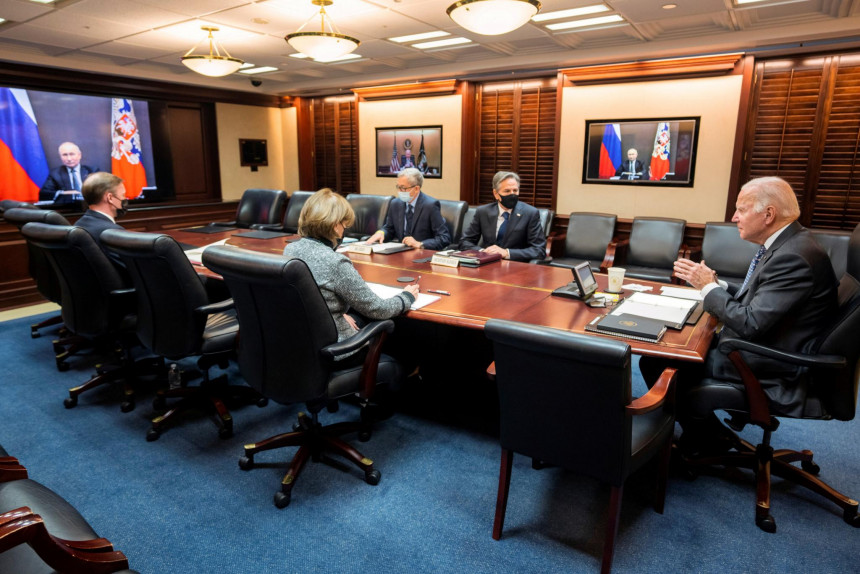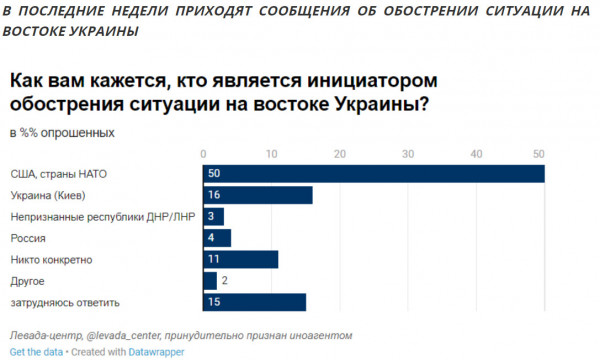Kremlin is behaving more aggressively, Russians blame the US for tensions

Putin's Russia has once again shown that it knows how to surprise. Here are the words with which Russian Deputy Foreign Minister Sergei Ryabkov put on the table the draft Russia-US Security Guarantee Treaty: "Everything is handed to you on a plate. All you have to do is sign it. It can basically be done in a few days." The tone was roughly that of Zhukov accepting Keitel's surrender in Berlin on May 8, 1945.
A month or so ago, the news around the world carried alarming reports of the concentration of Russian troops on the Ukrainian border. This was followed by a two-hour video conversation between US President Joe Biden and Russian President Vladimir Putin, in which the parties agreed to "continue consultations". The danger seemed to have been averted, Putin got what he wanted (recognition from the US as an equal partner), and a possible war in Europe (Ukraine) was at least temporarily averted. But the joy was short-lived. On December 15, the Russian Foreign Ministry presented the fruits of the "continued consultations". A draft agreement was officially published, which looked more like an ultimatum than a document that could be taken as a starting point for discussions. Moreover, the document was presented in a style not seen in world diplomacy since Hitler.
What is it about this offer that makes one very wary of the situation? Basically, it proposes, in a straightforward text, to divide up the spheres of influence in Europe. The US must undertake to guarantee not to expand NATO eastwards and not to take into the organization the countries that were once part of the USSR. Even more. Not to enter into any military cooperation with them. No advisers, no consultancy, no arms or any other kind of assistance. All military cooperation with Ukraine must cease as soon as the treaty is signed.
The craziest thing is that now Moscow has taken the liberty of grossly humiliating those who have hitherto been its silent supporters, namely Western European politicians, who have been stripped of their subjectivity. The draft treaty stipulates that it is between Russia and the US only (on NATO), which means that the other NATO members are not considered equal. "We propose bilateral negotiations with the US [on NATO guarantees]. If we involve other countries, we will simply drown it all in debate and verbiage," Ryabkov explains. Even if someone in the Kremlin thinks so, you don't say things like that in diplomacy. But Putin has turned the Leningrad street style of speech into the new diplomatic language.
This is not the end of Russia's demands for cooperation between NATO countries and the former USSR. It demands the removal of NATO forces from Eastern Europe that have been there since the signing of the Russia-NATO Founding Act on Mutual Relations, Cooperation and Security on May 27, 1997. We are talking about air defense systems in Poland and Romania, as well as four multinational battalions in the Baltic States and Poland.
Finally, Russia is demanding that the US radically change its nuclear strategy in Europe. Namely, to unilaterally withdraw its small nuclear arsenal (around 200 units) from Europe, which is militarily insignificant compared to the combined US and Russian nuclear forces (each side has around (more than) 10,000 units). However, this nuclear strategy serves as a significant deterrent in the overall NATO strategy.
It must be said, Russia's openly brazen offer is shocking. Unfortunately, possible future scenarios range from bad to very bad. The problem is that these kinds of demands are usually made at times when the people making them do not even want them to be accepted. Let us recall the Austro-Hungarian ultimatum to Serbia on July 23, 1914. The demands were absolutely unacceptable, but Serbia, in order to avoid war (on Russia's advice), accepted 9 out of 10 points. However, one unaccepted one was enough to start the war.
Some political analysts put this move on Putin's tendency to bluff. This is his usual practice, and this time will be no different. At first, it may seem so, but now it is beginning to look as if Putin is deliberately driving himself into a dead-end to burn all the bridges behind him and have nowhere to retreat, because even if it is only a bluff, sooner or later the situation becomes clear: either you have won and your opponent has thrown down his cards, or...?
It must be understood that after these undiplomatic moves Moscow can no longer pretend that there were no ultimatums, let's just forget it and move on with our lifes. This would destroy the entire structure that has been built up over the years and show the West that Putin is an empty bluffer who is not worth taking into account. Russia will therefore have to demonstrate the seriousness of its words, whether it wants to or not.
We can talk a lot about political poker, about bluff, about the new diplomatic etiquette, but the most important question is whether or not Putin ultimately wants war with Ukraine. On this question, opinions are divided. My personal view is that it is more likely that he does. I tend to agree with those commentators who call for Putin's and the Kremlin's propaganda texts to be taken simply. Exactly as they are expressed, without looking for some hidden subtext. If Putin says that Russians and Ukrainians are one people divided by the Americans, then there is no point in proving that this is not the case and that everything is completely different. Putin himself believes this, as well as the idea that, if the "Ukrainian question" is not resolved, NATO missiles will appear there tomorrow, or at the latest, the day after tomorrow, whose [possible] presence within a few minutes' flight, as an analysis of Putin's texts shows, is the main thing that plagues his mind.
What is the West, above all the US, to do in this situation? One might think, well, what's the big deal - let's give Putin those guarantees not to expand NATO eastwards if he wants it so badly. After all, there are no real plans to admit Ukraine to NATO at the moment. For the rest, we could pretend it was nothing. Forget it. But here is a purely formal aspect that is, in fact, extremely important. Even existentially important.
There is the NATO Bucharest Decision of 2008, which says that the way is open for Ukraine and Georgia to join NATO. There is hardly any specificity in this decision, except that at some unspecified future date, when the "criteria are met," these countries will be admitted. Now another non-NATO country is saying: we do not like this decision of yours, change it on our instructions. From the point of view of international diplomacy, this is unprecedented insolence. Moreover, this demand is not being made quietly behind the scenes, but is being made publicly in a rather rude, insulting manner. Perhaps Biden could give Putin such assurances verbally. Maybe he even did so during the recent videoconference, but Putin is not satisfied with such "guarantees." He needs Biden to drink the bitter cup to the dregs. In public.
What are the predictions? Most US and other Western politicians and analysts are so used to speaking in the language of utter platitudes that they give the impression that they themselves unquestioningly believe all their endlessly repeated mantras about effective sanctions to deter Putin; the "high price" he will have to pay if he does or does not do this, that or the other; the children of Kremlin cronies living in the West; and similar stories. Thus, they try to convince themselves and the outside world that there is no reason to worry. Unfortunately, it is not only the West that is disoriented by these stories. As General Ben Hodges, former Commander-in-Chief of the US Armed Forces in Europe, told CNN: "There are still a lot of mixed messages coming out of the White House and a couple of unforced errors that the Kremlin must be quite happy with." Putin, in other words, does not believe in a serious Western backlash against the launching of hostilities in Ukraine.
But the greatest danger, in my opinion, comes from the fact that, compared with the USSR, Russia has completely changed its prevailing public ideological thought. In Brezhnev's time, there were posters everywhere saying: "The USSR is the guardian of peace," but today the opposite is chanted every day: "We can repeat [the Berlin takeover]."
Levada, Russia's most reliable opinion polling agency, has just published the latest polling data on who Russians blame for the escalating situation on the border with Ukraine. The results are not encouraging. 50% of Russians believe that the US (NATO) is to blame for the escalation of the situation, 16% - Ukraine and only 4% - Russia. Another 3% think that the unrecognized "republics" are to blame.

This means that the Russian people are generally in favor of giving a strong counterreaction to Ukraine and NATO. In other words, hopes that a possible war might be unpopular among the population and that there will not be a "second Crimea" may be unfounded. On the contrary. War is expected in Russia. This can also be understood. If the propaganda has been whipping up war hysteria for seven years now, but nothing is really happening, then a feeling of frustration is gradually building up - well, how long can people be kept in suspense? When will there finally be a solution?
According to US intelligence, a possible attack on Ukraine could come at the end of January. So, we shall soon see whether this time the predictions will be right, or whether they will be wrong again.
*****
Be the first to read interesting news from Latvia and the world by joining our Telegram and Signal channels.
